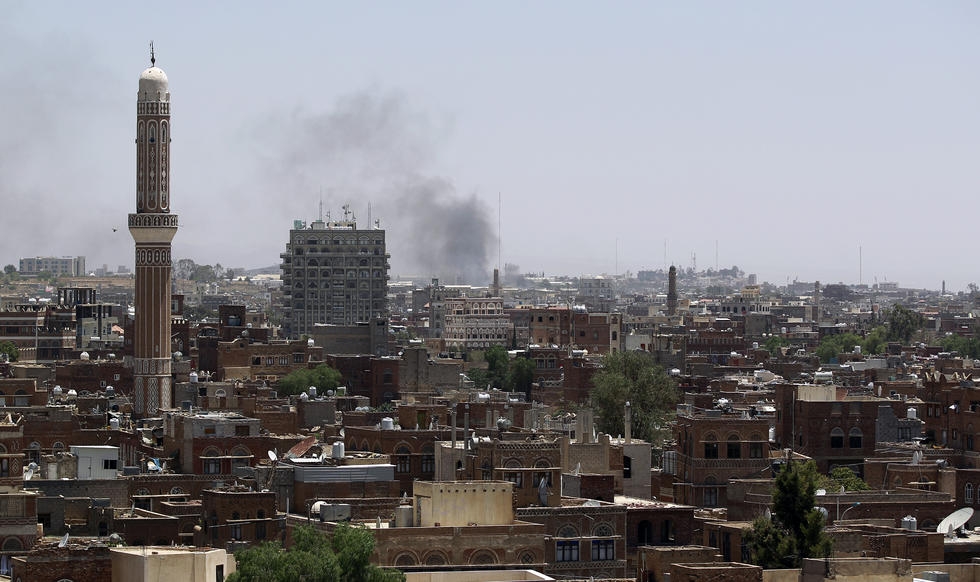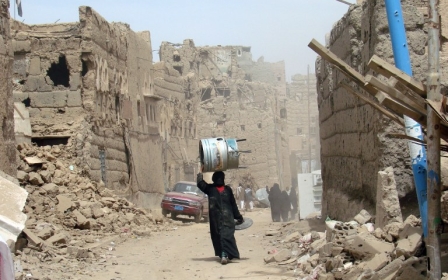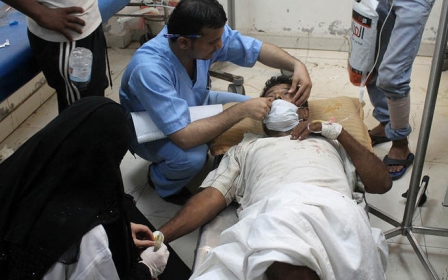UN says half a million Yemenis displaced as capital pounded

By Jamal al-Jabiri with Fawaz al-Haidari
SANAA - The United Nations said more than half a million people have been displaced due to the conflict in Yemen, where the capital was bombarded on Tuesday for the first time since a ceasefire ended.
Hopes faded for a political breakthrough in the two-month conflict with a UN-sponsored peace conference originally set for next week put on hold because of the resumption of fighting.
A conference of Yemeni political factions held in Riyadh, meanwhile, vowed support for "resistance" forces battling Houthi fighters.
A Saudi-led coalition has waged an air war on the Houthis in Yemen since March in an effort to restore the authority of exiled President Abd Rabbuh Mansour Hadi, who fled to Riyadh.
The UN, citing Yemen's health services, said that as of 15 May, some 1,850 people had been killed and 7,394 wounded in the violence in Yemen. Another 545,000 had been displaced, up from 450,000 announced on Friday.
The UN refugee agency said its assessments on the ground during the five-day ceasefire had "exposed enormous difficulties for thousands of civilians displaced by conflict".
The World Food Programme said while the pause was "not long enough to reach all those in need", it had managed to deliver food to 400,000 people, just over half the 738,000 it had aimed to help.
About 7,000 refugees have fled to Somalia - mostly Somalis returning home - since the Saudi-led air war started, Nicholas Kay, the UN special representative for Somalia, said on Tuesday.
After the ceasefire expired at the weekend, the Saudi-led coalition resumed its bombing on Monday with raids on it’s second-largest city, Aden, accusing the Houthis of violating the truce.
"They did not respect the humanitarian pause. That's why we do what is necessary to be done," spokesman Brigadier General Ahmed al-Assiri told AFP.
Tuesday's raids on the capital hit the presidential palace complex and several bases of troops loyal to former autocratic president Ali Abdullah Saleh, allied with the Houthis.
The targets included the Republican Guard missile brigade base in Fajj Attan in southern Sanaa, where strikes last month set off a chain of explosions that killed 38 civilians.
An arms depot in Mount Noqum, on Sanaa's eastern outskirts was also targeted, as well as a house of Saleh in his Sanhan hometown, south of the capital, witnesses said.
The coalition also hit air defence and coastguard bases in Hodeida province, as well as targets in the central provinces of Taez and Ibb, and in Daleh and Aden in the south, they said.
UN talks postponed
A three-day conference in Riyadh boycotted by the Houthis wrapped up with some 300 participants publicly backing Hadi and calling for safe zones allowing his government to resume its duties.
In a closing statement, they called for quicker delivery of supplies to pro-government forces including "logistical equipment and weapons".
The conference came as a planned, UN-brokered meeting of Yemeni political groups in Geneva was suspended indefinitely.
"Part of the problem is that the fighting has once more resumed," said UN spokesman Farhan Haq.
"We want the fighting decisively stopped and then we can get about to organise and invite people to the conference."
UN Secretary-General Ban Ki-moon appealed to "all parties to create the conditions leading to a permanent ceasefire".
A US State Department spokesman called on the Houthis to "indicate their readiness and their willingness to come back to the table as part of a UN-led process".
Houthis 'hijacked' aid
Iran, a key ally of the Shiite Houthi fighters, demanded an end to the Saudi bombing, and said Riyadh was not a suitable location for peace talks.
Ali Akbar Velayati, foreign affairs adviser to Iranian supreme leader Ayatollah Ali Khamenei, said there must be an "end to barbaric Saudi raids that target innocent Yemeni civilians".
The ceasefire allowed supplies of petrol and food to be delivered to Yemen but anti-Houthi groups accuse the rebels of confiscating the aid.
"The truce has only served the aims of the militia, which has increased its readiness and stocked fuel through aid that arrived in their areas of control," said a statement from pro-Hadi forces in the central city of Taiz.
New MEE newsletter: Jerusalem Dispatch
Sign up to get the latest insights and analysis on Israel-Palestine, alongside Turkey Unpacked and other MEE newsletters
Middle East Eye delivers independent and unrivalled coverage and analysis of the Middle East, North Africa and beyond. To learn more about republishing this content and the associated fees, please fill out this form. More about MEE can be found here.




